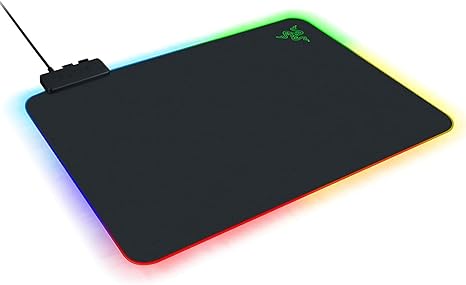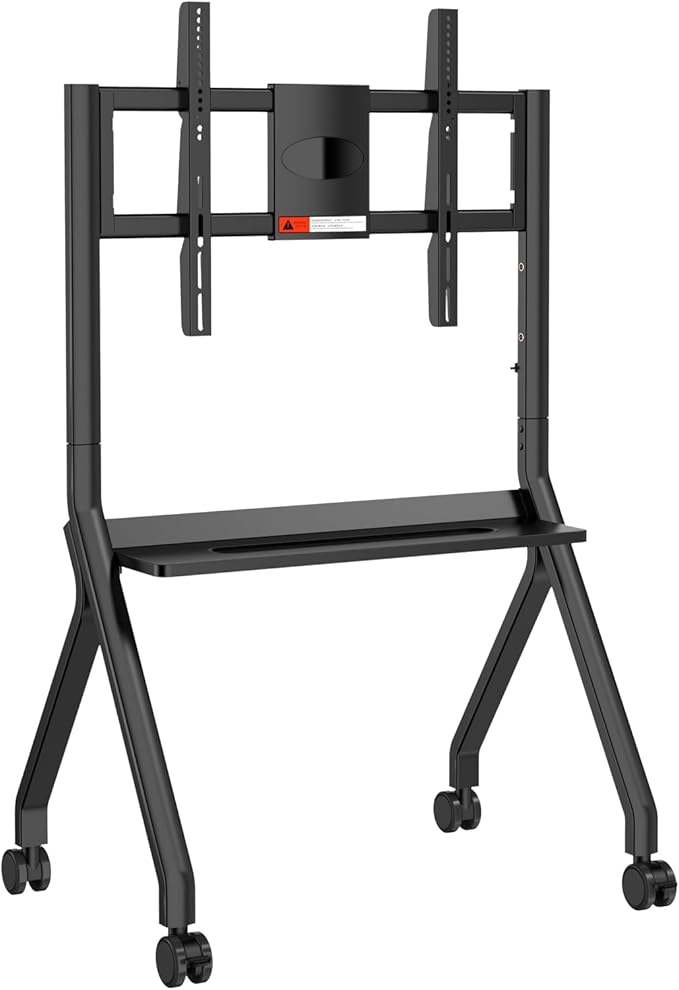We have learned how to say hello in Italian? in the previous lesson, however, in this lesson, we will see how do you say goodbye in Italian, after finishing a conversation.
There are so many ways of saying goodbye in Italian and some of them are formal which means you can use them in formal situations like when you talk to strangers. Other ways are informal where you can use them when talking to a friend or someone you know.
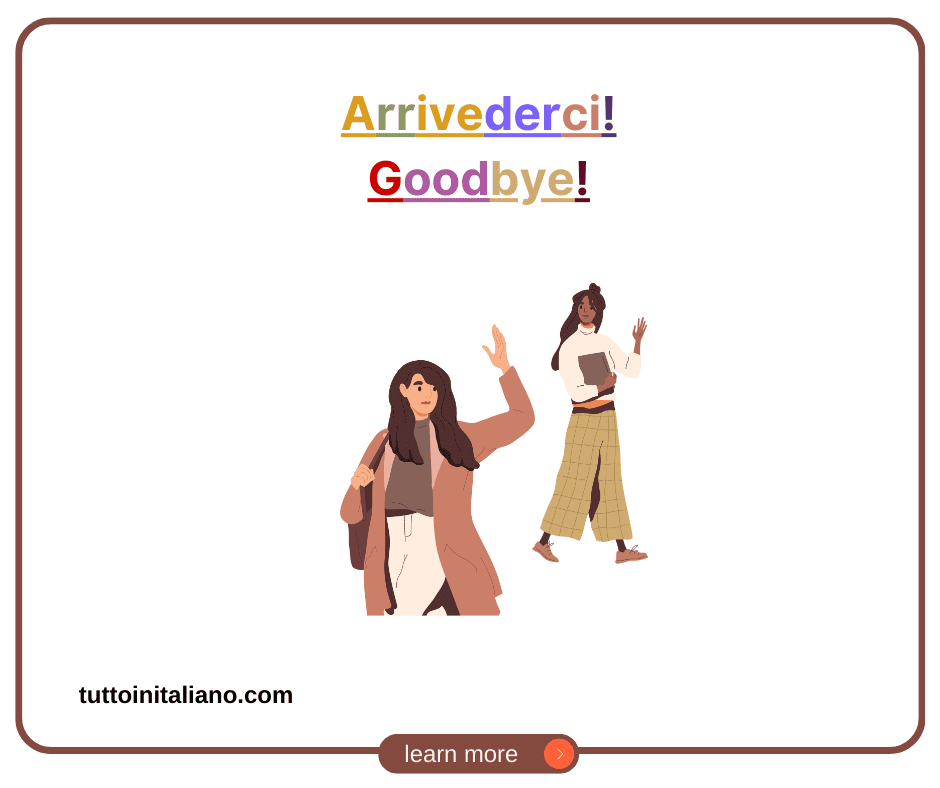
How do you say “Goodbye” in Italian? (Formal and Informal):
1) Ciao! (bye)
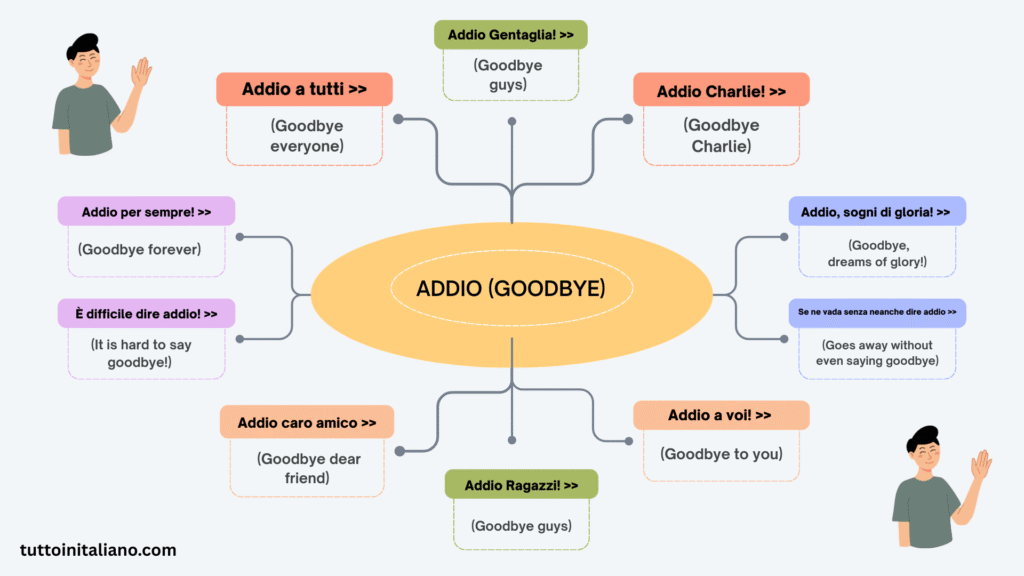
Ciao! is the most used word in Italian because it means either “Hello” or “Bye“, however, “Ciao” is only used in informal situations.
Ciao is only used with friends and relatives or people we know and are the same age as us.
- Ciao! >> (Bye!)
- Ciao a tutti >> (Bye, Everyone)
- Ciao Ragazzi! >> (Bye, Guys)
- Ciao, Papà >> (Bye, Dad)
- Ciao, Me ne vado >> (Bye, I’m gonna go)
- Vado, Ciao! >> (I’ll go, Bye)
- Ciao Ciao! >> (Bye bye)
- Come puoi andartene senza neanche dire ciao? >> (How can you leave without even saying goodbye?)
2. Addio (Goodbye)
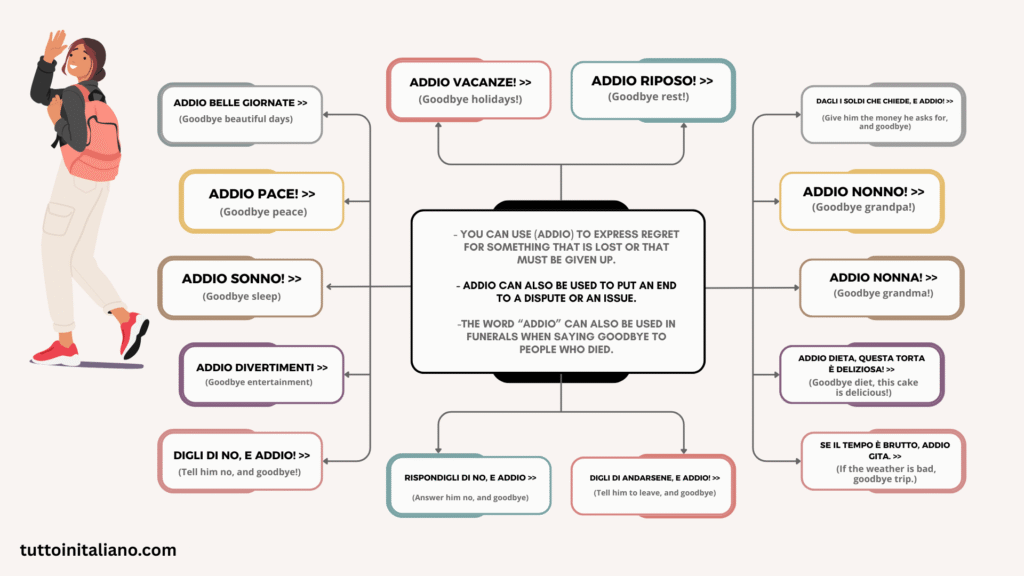
The two words ” Ciao” and ” Addio“ are pretty similar. They both mean “Goodbye” in Italian; however, “Addio” is more formal than “Ciao“.
“Addio” is a way of saying “Goodbye” in Italian when separating from someone or leaving someone.
The word “Addio” is a combination of the preposition (A) and the noun (Dio >> God). It comes from the old expression (Ti/Vi raccomando a Dio >> I recommend you to god), so when you say “Addio,” It’s the same as saying “I’m leaving you to God’s care and protection.”
- Addio Gentaglia! >> (Goodbye guys)
- Addio Ragazzi! >> (Goodbye guys)
- Addio a tutti >> (Goodbye everyone)
- Addio Charlie! >> (Goodbye Charlie)
- Addio caro amico >> (Goodbye dear friend)
- Addio a voi! >> (Goodbye to you)
- Addio per sempre! >> (Goodbye forever)
- È difficile dire addio! >> (It is hard to say goodbye!)
- Addio, sogni di gloria! >> (Goodbye, dreams of glory!)
- Se ne vada senza neanche dire addio >> (Goes away without even saying goodbye)
You can use (Addio) to express regret for something lost or must be given up.
- Addio Vacanze! >> (Goodbye holidays!)
- Addio riposo! >> (Goodbye rest!)
- Addio belle giornate >> (Goodbye beautiful days)
- Addio pace! >> (Goodbye peace)
- Addio sonno! >> (Goodbye sleep)
- Addio divertimenti >> (Goodbye entertainment)
- Con quella macchia posso dire addio al mio vestito >> (With that stain I can goodbye to my dress)
- Addio a tutte le ore passate a guardare il cellulare, aspettando il messagio del ragazzo che mi piace. >> (Goodbye to all the hours spent looking at the cell phone, waiting for a message from the boy I like)
- Posso finalmente dire addio alla scuola per sempre >> (I can finally say goodbye to the school forever)
- Addio dieta, questa torta è deliziosa! >> (Goodbye diet, this cake is delicious!)
- Se il tempo è brutto, Addio gita. >> (If the weather is bad, goodbye trip.)
Addio can also be used to end a dispute or an issue.
- Digli di no, e addio! >> (Tell him no, and goodbye!)
- Rispondigli di no, e addio >> (Answer him no, and goodbye)
- Dagli i soldi che chiede, e addio! >> (Give him the money he asks for, and goodbye)
- Digli di andarsene, e addio! >> (Tell him to leave, and goodbye)
The word “Addio” can also be used in funerals when saying goodbye to people who have died.
- Addio Nonno! >> (Goodbye, grandpa!)
- Addio Nonna! >> (Goodbye, grandma!)
Amazon Ads
3. Arrivederci! / ArrivederLa! (Goodbye)
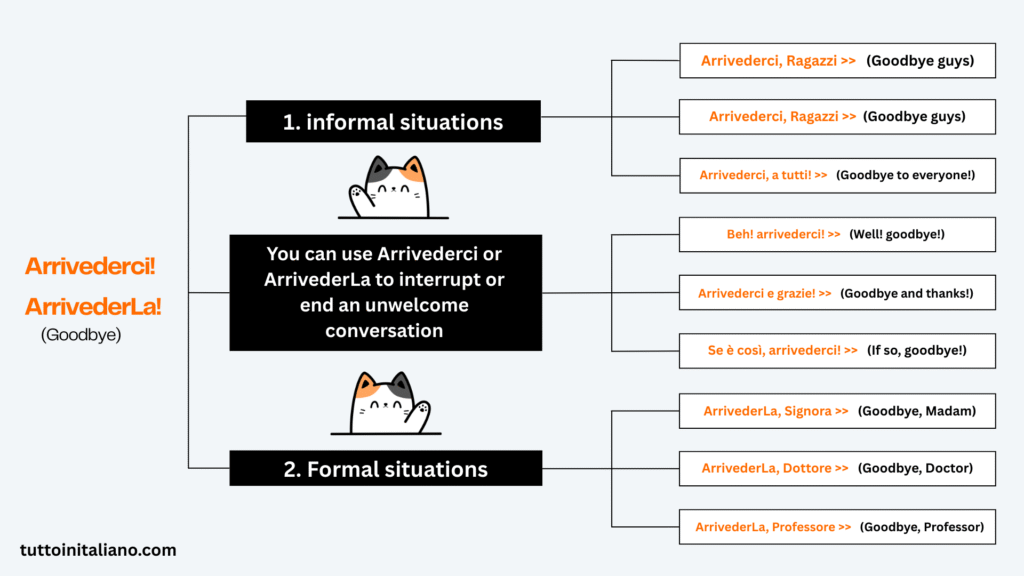
Arrivederci and ArrivederLa are other expressions of greeting between people who separate with the certainty or hope of seeing each other again.
Here is how to use Arrivederci/ArrivederLa in different situations:
1. Informal situations
Informal situations are when you say goodbye to a friend or with people you know, and in this case, we use “Arrivederci.”
- Arrivederci, Ragazzi >> (Goodbye guys)
- Arrivederci, Ragazze! >> (Goodbye girls)
- Arrivederci, a tutti! >> (Goodbye to everyone!)
- Arrivederci, Maura! >> (Goodbye, Maura!)
2. Formal situations
Formal situations are when saying goodbye to someone you have to respect, or with people, you don’t know, and in this case, we use “ArrivederLa“
- ArrivederLa, Signora. >> (Goodbye, Madam.)
- ArrivederLa, Dottore. >> (Goodbye, Doctor.)
- ArrivederLa, Professore. >> (Goodbye, Professor.)
- ArrivederLa, Signor Alberto. >> (Goodbye, Mr. Alberto.)
You can use Arrivederci or ArrivederLa to interrupt or end an unwelcome conversation
- Beh! arrivederci! >> (Well! goodbye!)
- Arrivederci e grazie! >> (Goodbye and thanks!)
- Se è così, arrivederci! >> (If so, goodbye!)
- Ho capito, arrivederci! >> (I get it, goodbye!)
- Arrivederci e buona notte! >> (Goodbye and goodnight!)
- Sì, Arrivederci! >> (Yes, goodbye!)
- Va bene, Arrivederci! >> (Okay, goodbye!)
4. Buona giornata (have a nice day)
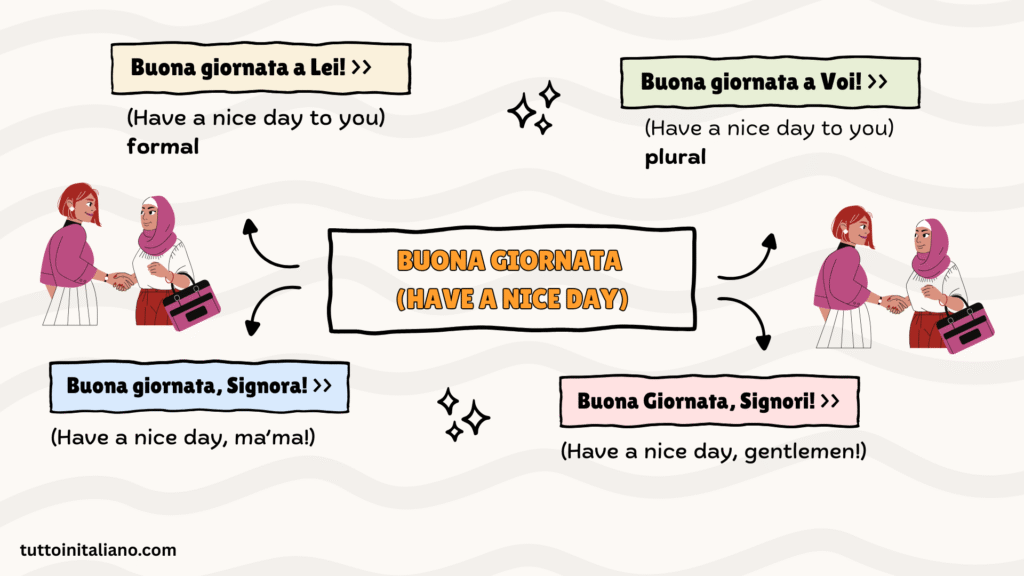
“Buona Giornata” is a combination of the two words “Buona >> Good” and “Giornata>> Day“, Which means “Have a nice day“, and is used more in formal situations.
“Buona Giornata” is the same as “Buon Giorno” but the second one is when you meet someone, while the first one is when you leave someone in the morning.
“Buona Giornata” is only used to wish someone to pass the rest of the day in the best way.
- Buona giornata a Lei! >> (Have a nice day to you) Formal
- Buona giornata a Voi! >> (Have a nice day to you) Plural
- Buona giornata, Signora! >> (Have a nice day, ma’ma!)
- Buona Giornata, Signori! >> (Have a nice day, gentlemen!)
5. Buona Serata (Good evening)
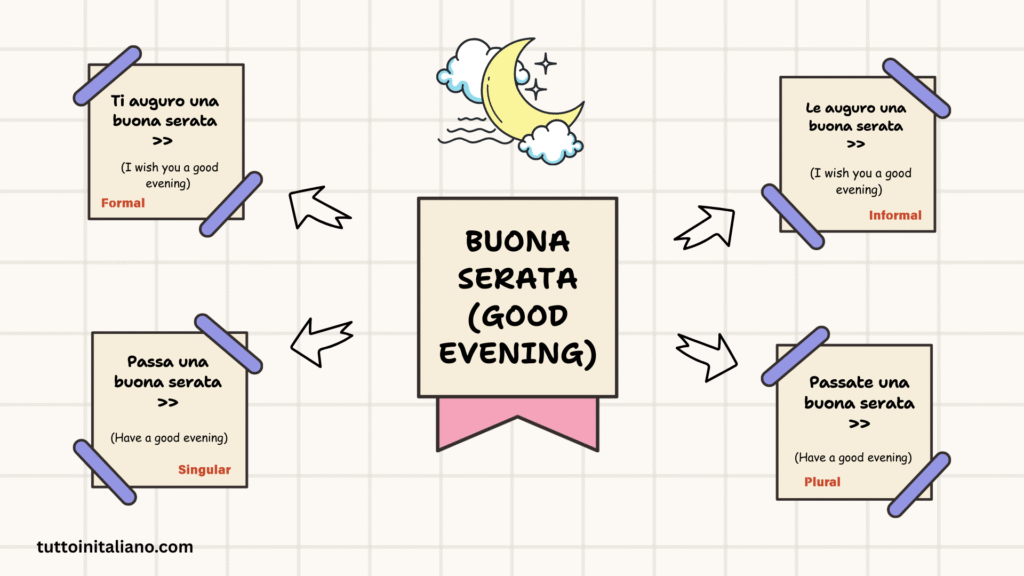
In place of “Buona sera >> Good evening“, sometimes you can use “Buona serata” which has the same meaning, but the only difference between them is the timing.
“Buona sera” is when you meet someone in the evening; meanwhile, “Buona Serata” is when you leave someone and wish for them to spend the rest of the evening in the best way; it also can be used in formal or informal situations.
- Ti auguro una buona serata >> (I wish you a good evening) Formal
- Le auguro una buona serata >> (I wish you a good evening) Informal
- Passa una buona serata >> (Have a good evening) Singular
- Passate una buona serata >> (Have a good evening) Plural
Amazon Ads
6. Buonanotte (goodnight)
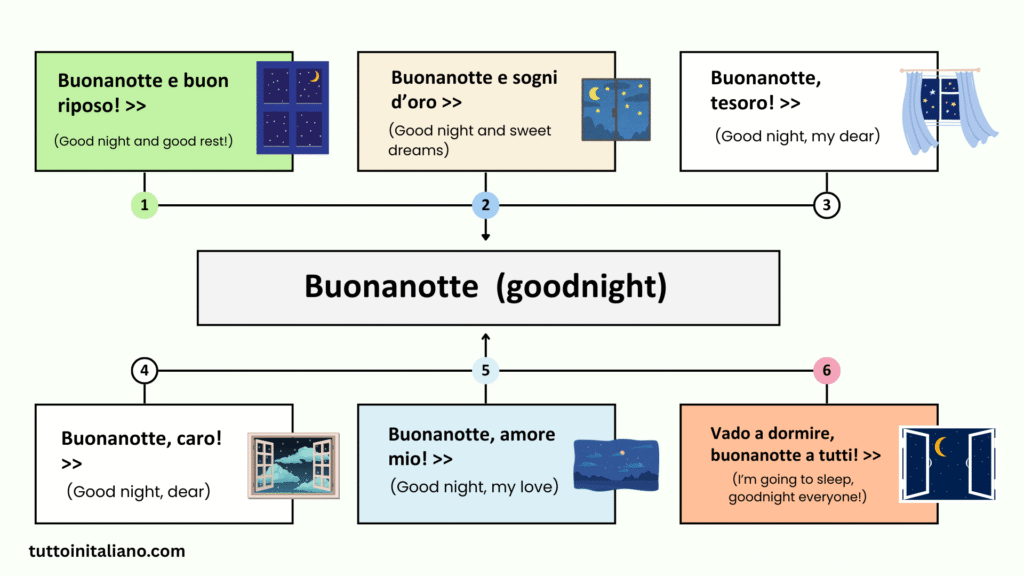
“Buonanotte” is a combination of two words: “Buona >>Good” and “Notte>> Night,” Which means “Goodnight” and can be used in formal or informal situations.
You can use this expression if you want to end a conversation by saying “Goodnight” instead of “Goodbye“.
The expression “Buonanotte” can only be used at a late time of the day or before bedtime.
- Buonanotte e buon riposo! >> (Good night and good rest!)
- Buonanotte e sogni d’oro >> (Good night and sweet dreams)
- Buonanotte, tesoro! >> (Good night, my dear)
- Buonanotte, caro! >> (Good night, dear)
- Buonanotte, amore mio! >> (Good night, my love)
- Vado a dormire, buonanotte a tutti! >> (I’m going to sleep, goodnight everyone!)
7. Salve (Goodbye)
Salve in Latin is (Vale atque salve), meaning (Addio e stai bene >> goodbye and stay good). In ancient Rome, Salve was used when meeting or leaving someone, however, today, Salve is used much more when you meet and rarely when you leave someone.
Salve! is like “Ciao“. Both can mean “Hi” or “Bye”; however, salve is more formal and can be used to say goodbye on the phone
Salve! Salve! >> (Bye! Bye!)
8. Salutarsi (To say goodbye)
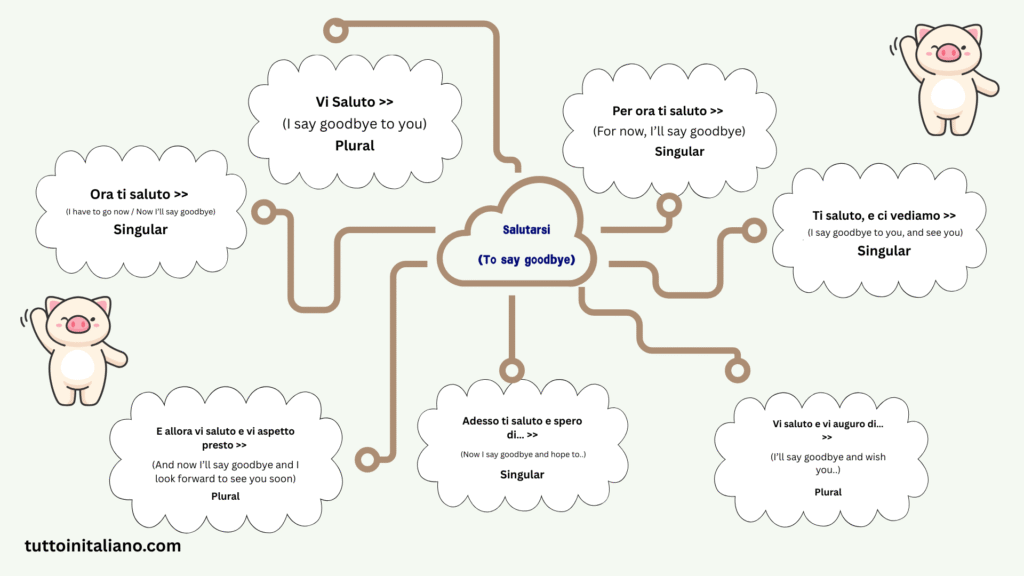
You can use the intransitive pronominal verb (Salutarsi) to say goodbye to someone when they leave or when you leave them.
Singular
- Ora ti saluto >> (I have to go now / Now I’ll say goodbye)
- Per ora ti saluto >> (For now, I’ll say goodbye)
- Ti saluto, ciao >> (I say goodbye to you, bye)
- Adesso ti saluto e spero di… >> (Now I say goodbye and hope to..)
- Ti saluto, e ci vediamo >> (I say goodbye to you, and see you)
Plural
- Vi Saluto >> (I say goodbye to you)
- E allora vi saluto e vi aspetto presto >> (and now I’ll say goodbye and I look forward to see you soon)
- Vi saluto e vi ringrazio. >> (I say goodbye to you and thank you)
- Vi saluto e ci vediamo alla prossima >> (I’ll say goodbye and see you next time)
- Vi saluto e vi auguro di… >> (I’ll say goodbye and wish you..)
- Vi abbraccio, Vi saluto un sacco >> (I hug you, I salute you a lot)
- Vi Saluto caramente molto volentieri >> (I salute you dearly and very willingly)
- Vi saluto e vi rimando alla prossima >> (I salute you and I send you back to the next)
Other ways of saying Goodbye in Italian
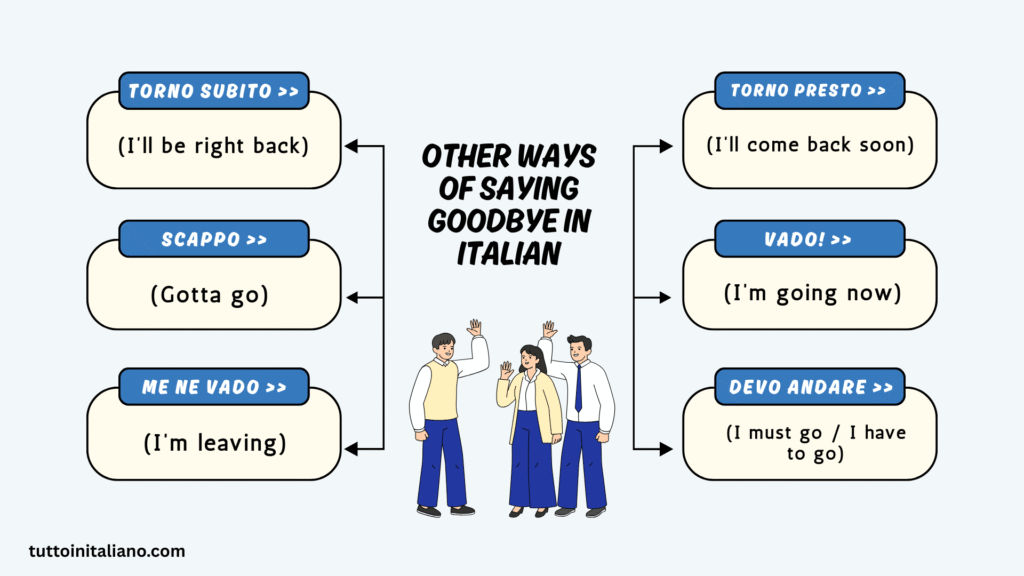
- Ti bacio/ Un bacio enorme e ci vediamo. >> (I kiss you / a huge kiss and see you)
- Ti abbraccio / un abbraccio da parte mia. >> (I hug you / a hug from me)
- Ti auguro una buona giornata. >> (Have a nice day)
- Devo andare >> (I must go / I have to go)
- Vado! >> (I’m going now)
- Me ne vado >> (I’m leaving)
- Scappo >> (Gotta go)
- Torno presto >> (I’ll come back soon)
- Torno subito >> (I’ll be right back)


